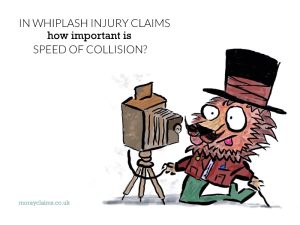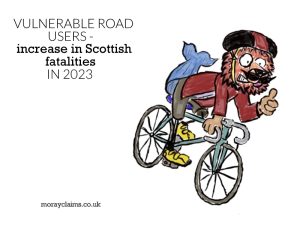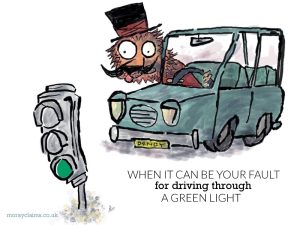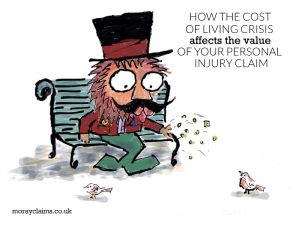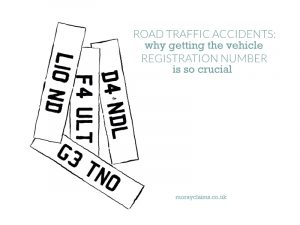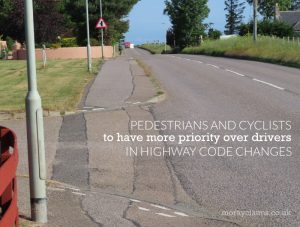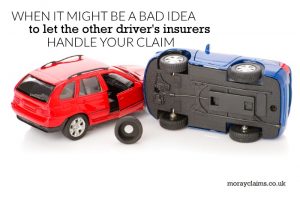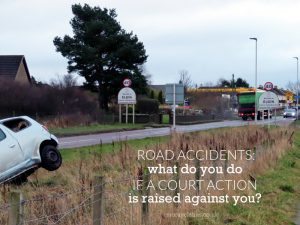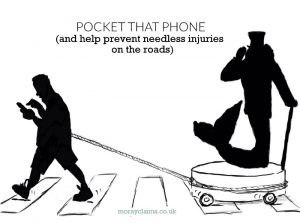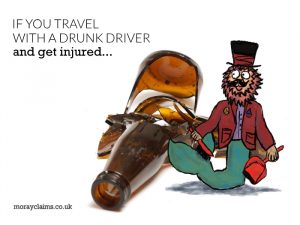By definition, whiplash injuries are caused by low velocity impacts. The perpetual difficulty we have in describing whiplash injuries stems from the fact that there is, by definition, no structural pathology (i.e. nothing that can be independently verified by x-rays or other scans) They say that whiplash-associated disorders remain 'a diagnosis of exclusion'. In other words, if you seem to be dealing with 'appropriate' symptoms and nothing else would explain them, "whiplash" is your diagnosis because you have excluded all other possibilities. What is the mechanism of a whiplash injury? The mechanism of a whiplash injury involves the initial acceleration of the vehicle occupant due to force being transmitted through the vehicle in which they are seated - typically, a rear-end shunt of their vehicle. This results in the occupant to moving forward. In moving forward, the occupant’s head and upper cervical spine (neck) lags behind very slightly compared to the movement Continue Reading
Rise in fatalities among vulnerable road users in Scotland
Recently-released statistics have shown that as compared with 2022, 2023 saw a reduction in the overall number of deaths on Scotland’s roads. This is good news. However, lurking within these statistics, there was, unfortunately, an increase in deaths within the sub-category for vulnerable road users. Vulnerable road users include motorcyclists, pedal cyclists and pedestrians. The figures for serious injuries within each of these subcategories also showed an increase as between 2022 and 2023. The indications are that, for car users, road safety levels continued to improve. But if you are walking or travelling on two wheels, it is more of a bleak picture. Given that we are all being encouraged to engage in more active forms of travel (e.g. walking and pedal cycling), the signs are that the Government is going to need to do more to reassure the public that proper safety measures are being put in place (e.g. separated-from-carriageway active travel routes such as Continue Reading
When it can be your fault for driving through a green light
You’re in a rush. It’s a dark, wet Monday morning in January. You want to cross the main road on foot at traffic lights, using the pedestrian crossing there; but the lights are green for vehicles - and red for you to cross. On the approach to the traffic lights for vehicles, there are two bus stops. It’s a predominantly residential area. You decide you have to risk crossing on red. Dashing onto the crossing, you suddenly realise an approaching car is bearing down on you. It’s about 5m away and travelling close to the speed limit of 30mph. Your brain freezes with panic. You've misjudged the speed of the oncoming vehicle. You’re rooted to the spot. Paralysed with fear. It's too late to get out of the way. Though the car driver instinctively swerves to avoid you, having only noticed you late, the collision is inevitable. The impact throws you up onto the bonnet. Your head hits the nearside windscreen, causing a “bullseye” break in the glass - i.e. a spider’s web-like Continue Reading
How the Cost of Living Crisis affects the Value of Your Personal Injury Claim
In July 1971, a sliced white loaf of bread would have cost you 10 pence. In July 2021 the cost would have been £1.06. The Retail Price Index ("RPI") shows an average cost for the same loaf of bread as £1.36 in July 2023. The rise in prices over time is known as inflation. It can also be described as the decline of purchasing power over time. In the present Cost of Living Crisis, the upward trend in prices is affecting most things and that includes personal injury compensation (compensation also sometimes referred to as “damages”). The injury part - for the "pain and suffering" associated with the injuries - of a personal injury compensation claim is just one element of the value of the claim as a whole. Other elements can include wage loss and necessary travel expenses. In this article, we are only discussing the injury part of personal injury claims. This can be variously described as "pain and suffering", General Damages and solatium. Continue Reading
Why the crucial road accident information to get is the registration number
If you have been injured as a result of a road traffic accident, although it is the driver of the vehicle at fault for the accident who bears the blame, it is their insurance company that will pay your compensation in most cases. As a result, you and your solicitors want to find out as quickly as possible who those insurers are and how best to contact them. There is a lot of information you can usefully gather to give to your solicitor following a road traffic accident but what do you think is the single most important piece of information? What you absolutely want to get if you can is the registration number of the vehicle which caused the accident. This applies whether you were In the “best case”, you will be well enough and quick-witted enough to get the registration number yourself. But that won’t always be the case, especially if you have been seriously hurt in the accident. In this article, we will look at three reasons why getting the registration number Continue Reading
How Grigor & Young help you with a road traffic accident injury claim in Moray
Grigor & Young LLP, Solicitors, use Moray Claims as a trading name in their business of dealing with personal injury compensation claims for clients. Grigor & Young have offices in Elgin and Forres, Moray. Personal injury compensation claims arising from road traffic accidents are usually against insurers of the driver who was to blame for the accident. If that driver was uninsured or is untraced, the claim may be against the Motor Insurers' Bureau. Injuries resulting from road traffic accidents can happen in many different ways. If we take on your claim at G&Y, it will be via one of the following three funding methods. Legal aid Whether you qualify for legal aid depends upon your financial circumstances. If you qualify for legal aid, we will give close consideration to using that as the funding mechanism for the claim though we will also discuss with you the other options mentioned below. Note that, if your claim is successful under any form Continue Reading
Whiplash Claim in Scotland? Make sure you apply the right rules
In Scotland, we are used to being lumped in with England and other parts of the UK in all sorts of situations where that may be misleading or even wrong. Sometimes the law is the same in Scotland as in the rest of the UK and sometimes it’s not. Personal injury claims are usually based upon negligence of one person causing injury to another. The modern law of negligence for the UK (and much of the world) is based on the Scottish “snail in the ginger beer bottle” case of Donoghue –v- Stevenson. But some areas of personal injury law differ markedly between the jurisdictions. For example, the law relating to claims in cases of fatal accidents and payment of bereavement damages to relatives of deceased persons. Scotland has had a more ‘generous’ compensation scheme in this type of case than the rest of the UK for a long time. But one area where there has been a parting of the ways between Scotland, on the one hand, and England and Wales, on the other, has come as recently as May Continue Reading
Pedestrians and cyclists to have more priority over drivers in Highway Code changes
Walking and cycling have become more popular during the pandemic. So-called “active travel” has benefits for personal health as well as the environment. Department for Transport figures show that, over the last year, there’s been a 46% increase in the number of miles cycled on British roads. Tellingly, that’s a larger increase than in all of the previous 20 years combined. To take even one corner of Moray as an example... While the Lossiemouth - Elgin cycle path beside the A941 has been an active travel benefit for many years, the long-mooted track to connect Lossiemouth to Hopeman has only recently gained significant traction, despite years of campaigning. Now that the charitable organisation (SCIO) Laich of Moray Active Travel Routes is in existence, and with help from Sustrans, a connection between Lossiemouth and Covesea is coming. Hopefully, the final link from Covesea to Hopeman - to cover places such as the Green Road, Gordonstoun and Duffus - will not be far Continue Reading
Help From The Other Driver’s Insurer (How To Avoid Being Misled)
An "innocent third party car claim" is how some motor insurers describe what you have if one of their customers has crashed into your vehicle and it’s not your fault. In other words, the motor insurers in question are the third-party insurers, not your own motor insurers. Their customer was to blame for the accident. The third-party insurers’ offer to you is that you should let them take care of you and your vehicle in sorting things out. This help from the other driver's insurer can include: the repair of your vehicle (or a payment to represent its value if it has been written off), use of a hire vehicle, free of charge, while your own vehicle is being repaired; and help if you have been injured – to include treatment/rehabilitation and compensation. But couldn't you deal through your own insurers? If you have comprehensive motor insurance, one of your options is to deal with a claim for damage to your car through your own motor insurers. This can be an involved process. You may Continue Reading
Road Accidents: What To Do If A Court Action Is Raised Against You
We regularly get enquiries from people who have had a court action raised against them following involvement in a road traffic accident. If you are in that situation, what should you do? The typical scenario runs like this … You’ve had an accident with another vehicle when you were driving your car. The accident was your fault. The other vehicle was damaged or written off and the other driver was injured. Hopefully, you had comprehensive insurance and so your own vehicle will have been repaired or replaced by your insurers. They may also have told you they have settled the other party’s claim – by paying for the repair or replacement of their vehicle. Months later, out of the blue, you receive an Initial Writ or Summons (depending on whether the action against you is in the Sheriff Court or the Court of Session). This can be a startling experience, especially if the action is served on you by a Sheriff Officer or Messengers at Arms. The other driver – or maybe a passenger in that Continue Reading
Pocket that phone and help prevent needless injuries on the roads
It does not look the sort of road you would expect to see a pedestrian try to cross. Other than at traffic lights. Or using a bridge or underpass. Viewed through the dashcam of the slow-moving car in queuing traffic, we can see it’s an urban environment. The road has 4 lanes in each direction (we’re in the 3rd lane). A continuous concrete barrier about 4 feet high forms the central reservation. A young woman steps off the pavement to our left and begins crossing from left to right – for her, crossing the first half of the road. She’s on her mobile. She’s holding it up to her right ear. We can see her left hand gesturing as she chats. The field of view is distorted by the wide angle lens of the dashcam – it makes things look further away than they are in fact. As the woman crosses in front of our vehicle, she bows slightly to thank us for making room for her to pass through. The outside lane to our right has been empty throughout the 8 seconds or so since she Continue Reading
If you travel with a drunk driver and get injured
If you travel with a drunk driver and get injured due to their bad driving, does that mean you can’t claim? A September 2019 poll commissioned by Glasgow-based solicitors, Dallas MacMillan, indicated that two-thirds of those polled believed that if you agree to be a passenger in a car driven by someone you know is under the influence of alcohol, you won’t be able to claim compensation from the driver if they crash the car and you’re injured. This 66% (or so) majority are mistaken in their understanding of the law. People injured in such circumstances can claim successfully – and you may be surprised by how fully they can claim. We agree that travelling with a driver who is under the influence is a very bad idea. On the other hand, you should not lose sight of the fact that passengers in vehicles very rarely have no compensation claim available to them if they are injured in an accident. In this article, we’ll look at the law on accidents involving passengers in vehicles driven Continue Reading
